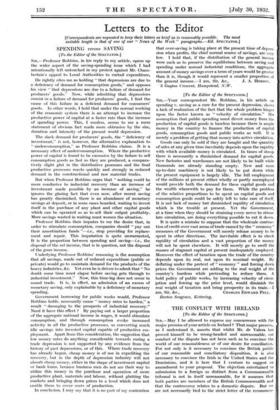[To the Editor of the SPECTATOR.] SIR,—Your correspondent Mr. Robbins,
in his article on spending v. saving as a cure for the present depression, shows a lack of realization of the fact that the whole problem hinges upon the factor known as " velocity of circulation." His assumption that public spending must divert money from the production of capital goods is baseless because there is ample money in the country to finance the production of capital goods, consumption goods and public works as well. It is merely a problem of getting that money into active circulation.
Goods can only be sold if they are bought and the quantity of sales at any given time inevitably depends upon the rapidity with which available money is circulated. In times of slump there is necessarily a diminished demand for capital goods. New factories and warehouses are not likely to be built while thousands are already standing empty. New and more up-to-date machinery is not likely to be put down while the present equipment is largely idle. The full employment of the millions at present either wholly or partly unemployed would provide both the demand for these capital goods and the wealth wherewith to pay for them. While the problem of the relative proportions to be spent on capital goods and consumption goods could be safely left to take care of itself, It is not lack of money but diminished rapidity of circulation which is the trouble at present. Yet the Government, at a time when they should be straining every nerve to stimu- late circulation, are doing everything possible to cut it down.
It is quite a mistake to suppose that the wholesale contrac- tion of credit over vast areas of trade caused by the " economy" measures of the Government will merely release money to be spent in other directions. The inevitable effect is to check rapidity of circulation and a vast proportion of the money will not be spent elsewhere. It will merely go to swell the masses of stagnant capital at present inadequately employed. Moreover the effect of taxation upon the trade of the country depends upon its real, not upon its nominal weight. By deflating under the pretext of " economy " and forcing down prices the Government are adding to the real weight of the country's burdens while pretending to reduce them. A bold policy of public works, by increasing velocity of circu- lation and forcing up the price level, would diminish the real weight of taxation and bring prosperity in its train.—I






























 Previous page
Previous page